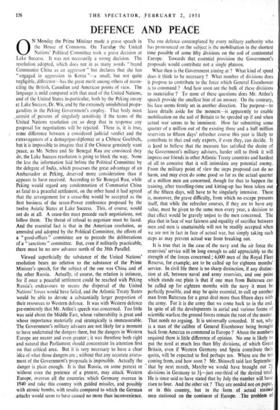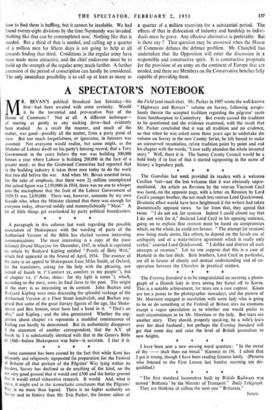DEFENCE AND PEACE
0 N Monday the Prime Minister made a grave speech in the House of Commons. On Tuesday the United Nations' Political Committee took a grave decision at Lake Success. It was not necessarily a wrong decision. The resolution adopted, which does not in as many words " brand Communist China as an aggressor " but declares that she has "engaged in aggression in Korea "—a small, but not quite negligible, difference—has the great merit among others of recon- ciling the British, Canadian and American points of view. The language is mild compared with that used of the United Nations, and of the United States in•particular, both by the Peking envoy at Lake Success, Dr. Wu, and by the extremely uninhibited propa- gandists in the Peking Government's employ. That body must ,consist of persons of singularly sensitivity if the terms of the United Nations resolution cut so deep that in response any proposal for negotiations will be rejected. There is, it is true, some difference between a considered judicial verdict and the extravagances of a demagogue-diplomat or a Chinese Goebbels, but it is impossible to imagine that if the Chinese genuinely want peace, as Mr. Nehru and Sir Benegal Rau are convinced they do, the Lake Success resolution is going to block the way. None the less the information laid before the Political Committee by the delegate of India, which possesses the great advantage of an Ambassador at Peking, deserved more consideration than it appears to have received. According to Sir Benegal Rau, while Peking would regard any condemnation of Communist China as fatal to a peaceful settlement, on the other hand it had agreed that the arrangement for a cease-fire would be accepted as the first business of the seven-Power conference proposed by the twelve Asiatic States at Lake Success. This, of course, would not do at all. A cease-fire must precede such negotiations, not follow them. The threat of refusal to negotiate must be faced. And the essential fact is that in the American resolution, as amended and adopted by the Political Committee, the efforts of a " good-offices " committee are to precede the deliberations of a " sanctions " committee. But, even if militarily practicable, there must be no new advance north of the 38th Parallel.
Viewed superficially the substance of the United Nations' resolution bears no relation to the substance of the Prime Minister's speech, for the subject of the one was China and of the other Russia. Actually, of course, the relation is intimate, for if once a peaceful settlement could be reached with Peking Russia's endeavours to secure the dispersal of the United Nations' forces would have failed, and the Atlantic Treaty States would be able to devote a substantially larger proportion of their resources to Western defence. It was with Western defence pre-eminently that Mr. Attlee's speech was concerned. Too little was said about the Middle East, whose vulnerability is great and whose importance materially and strategically is immeasurable. The Government's military advisers are not likely for a moment to have underrated the dangers there, but the dangers in Western Europe are nearer and even greater ; it was therefore both right and natural that Parliament should concentrate its attention first on that critical area. But it is very necessary to have a clear idea of what those dangers are ; without that any accurate assess- ment of the Government's proposals is impossible. Actually the danger is plain enough. It is that Russia, on some pretext or without even the pretence of a pretext. may attack Western Europe, overrun all the countries which Germany overran in 1940 and rake this country with guided missiles, and possibly with atomic bombs, with results compared to which the German attacks would seem to have caused no more than inconvenience. The one defence contemplated by every military authority who has pronounced on the subject is the mobilisation in the shortest time possible of some fifty divisions on the soil of continental Europe. Towards that essential provision the Government's proposals would contribute not a single platoon.
What then is the Government aiming at ? What kind of speed does it think to be necessary ? What number of divisions does it propose to contribute to the force which General Eisenhower is to command ? And how soon are the bulk of these divisions to materialise ? To none of these questions does Mr. Attlee's speech provide the smallest hint of an answer.' On the contrary, his face seems firmly set in another direction. The purpose—to leave details aside for the moment—is apparently to enable mobilisation on the soil of Britain to be speeded up if and when actual war seems to be imminent. How far submitting some quarter of a million out of the existing three and a half million reservists to fifteen days' refresher course this year is likely to contribute to that end only experts, if even they, can decide. It is bard to believe that the measure has satisfied the desire of the Government's military advisers, harder still to think it will impress our friends in other Atlantic Treaty countries and hardest of all to conceive that it will intimidate any potential enemy. From the military point of view the steps proposed can do no harm, and may even do some good so far as the actual quarter of a million men are concerned, though for that to happen the training, after travelling-time and kitting-up has been taken out of the fifteen days, will have to be singularly intensive. There is, moreover, the grave difficulty, Trom which no escape presents itself, that while the refresher courses, if they are to have any value, must be given to the same men every year, a decision to that effect would be gravely unjust to the men concerned. The plea that in face of war fairness and equality of sacrifice between men and men is unattainable will not be readily accepted when we are not in fact in face of actual war, but simply taking such steps as may prevent actual war from breaking out.
It is true that in the case of -the navy and the air force the reservists' service will be long enough to add appreciably to the strength of the forces concerned ; 6,000 men of the Royal Fleet Reserve, for example, are to be called up for eighteen months' service. In civil life there is no sharp distinction, if any distinc- tion at all, between naval and army reservists, and one point which stands out plain is that if one man from Battersea can be called up for eighteen months with the navy it must be perfectly possible, and may be quite essential, to call up another man from Battersea for a great deal more than fifteen days with the army. For it is the army that we come back to in the end. In spite of all the developments in aerial and various forms of scientific warfare the ground forces remain the root of the matter. That, needs no arguing. It is universally conceded. If not, why is a man of the calibre of General Eisenhower being brought back from America to command in Europe ? About the numbers required there is little difference of opinion. No one is likely to put the need at much less than fifty divisions, of which Great Britain, even if Western Germany and Spain contribute their quota, will be expected to find perhaps ten. Where are the ten coming from, and how soon ? Mr..Shinwell said last September " that by next month, March? we would have brought our 2i divisions in Germany to 3i—just one-third of the desired total. He is since said to have stated that by July the number will have risen to four. And the other six ? They are needed not on paper, or in this country, but in the form of actual trained men stationed on the continent of Europe.: The problem of



































 Previous page
Previous page